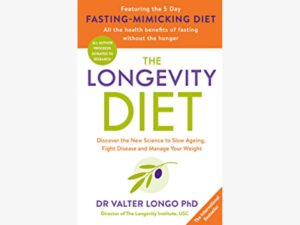 If you want to live a long and have a healthy life, consider some form of intermittent fasting. Some of the benefits of fasting include; cellular protection, regeneration and rejuvenation.
If you want to live a long and have a healthy life, consider some form of intermittent fasting. Some of the benefits of fasting include; cellular protection, regeneration and rejuvenation.
Valter Longo, Ph.D. is a researcher and the director of the Longevity Institute at the University of Southern California (USC). He has been investigating longevity for over two decades.
Dr. Longo’s findings and conclusions are featured in his recently released book, “The Longevity Diet: Discover the New Science Behind Stem Cell Activation and Regeneration to Slow Aging, Fight Disease, and Optimize Weight“.
Dr Longo was an advocate of a calorie restricted diet. This diet promotes eating 30% or less of your normal caloric amount that you would need to maintain a given body weight. You would do this until you would reach a body mass index (BMI) of about 19. BMI is calculated by taking your weight (in kilograms) and dividing by your height (in meters) squared.
You can find out your BMI here the easy way, by entering your weight in pounds and your height in feet and inches.
The BMI Categories Are; Underweight = <18.5, Normal Weight = 18.5–24.9, Overweight = 25–29.9, Obesity = BMI of 30- 39.9 and Morbid Obesity = BMI of 40 or more.
The calorie restricted diet has benefits, but also causes quite a few problems.
Dr Longo and his associates eventually discovered that a form of intermittent fasting that the named “The Fasting Mimicking Diet”, provided long-lasting benefits without the drawbacks of long-term calorie restriction.
They also found that sugar accelerates the aging process, as well as premature death.
Dr. Longo emphasizes the importance of cycling, which are cycles of fasting and eating. He warns that detrimental effects can occur from fasting for too long. The body will break down too much when you don’t eat for a prolonged period of time.
A basic intermittent fasting program is to eat during an 8 hour window each day and only drink water for the other 16 hours. Having this 8 hour window close at least 3 hours prior to going to bed at night is also recommended.
Before you go on any fasting program, you should consult your physician. This is especially true for people on medications and/or people with serious health conditions.

